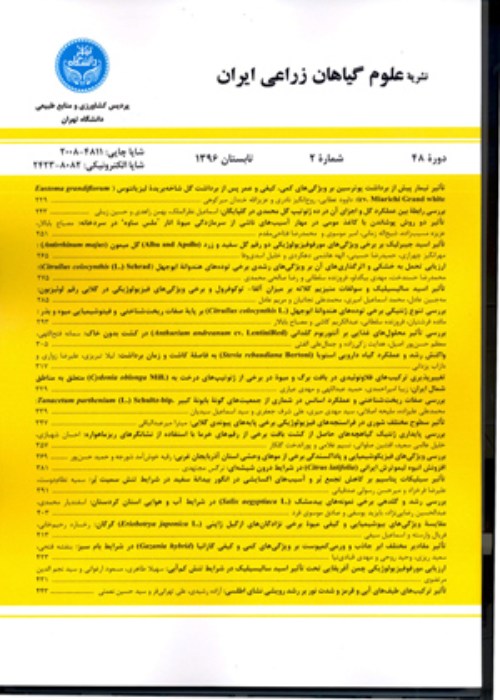Symbiotic Effectiveness and Salt Tolerance of Indigenous Populations of Medicago sativa Rhizobia from Tehran and Zanjan Soils
Abstract:
To evaluate symbiotic effectiveness and salt tolerance of Sinorhizobium meliloti strains, 50 rhizobial strains were isolated from root nodules of Medicago sativa cultivated in Tehran and Zanjan fields. Under N-free conditions, the symbiotic effectiveness of different Sinorhizobium meliloti strains of Bami cultivar were evaluated under greenhouse conditions using 50 Sinorhizobium meliloti strains, one uninoculated treatment with no nitrogen and two uninoculated treatments receiving 70 and 30 ppm Nitrogen. Shoot dry weight, nodule dry weight and nodule number recorded from two harvests were taken as the parameters of plant productivity. Salt tolerance of 50 rhizobial strains were evaluated in Yeast Manitol Agar medium involving different salt concentrations (0, 200, 400, 600 and 700 mM NaCl) according to colonies’ diameters. Significant differences were observed among rhizobial strains for shoot dry weight, nodule dry weight, nodule number and salt tolerance. Strain No. 30 was recorded as the most effective strain as indicated by the maximum values recorded for plant dry weight (1.31 gr/10 plants), while strain No. 6 was the least effective one because the plant inoculated with this strain was as poor in growth as control. The plants inoculated with other strains demonstrated higher shoot dry weight as compared with the uninoculated control. A Positive correlation between symbiotic effectiveness and shoot dry weight, nodule dry weight and nodule number was obtained. On the basis of analysis of correlation coefficient it was found that shoot dry weight, nodule dry weight and nodule number emerged as best criteria for selection of effective strains. Moreover, salinity slowed the growth of all strains. Strain No. 49 with 0.8 cm colonies’ diameter was able to grow well in the medium supplemented with 700 mM NaCl as compared with other strains. Strains with high effectiveness and high salt tolerance are promising for inoculant formulation in order to promote cultivation of alfalfa in saline soils. However, futher field experiments are needed to further evaluate improvement of M. sativa yield by inoculation under saline conditions.
Language:
Persian
Published:
Iranian Journal of Field Crop Science, Volume:41 Issue: 1, 2010
Page:
141
magiran.com/p743464
دانلود و مطالعه متن این مقاله با یکی از روشهای زیر امکان پذیر است:
اشتراک شخصی
با عضویت و پرداخت آنلاین حق اشتراک یکساله به مبلغ 1,390,000ريال میتوانید 70 عنوان مطلب دانلود کنید!
اشتراک سازمانی
به کتابخانه دانشگاه یا محل کار خود پیشنهاد کنید تا اشتراک سازمانی این پایگاه را برای دسترسی نامحدود همه کاربران به متن مطالب تهیه نمایند!
توجه!
- حق عضویت دریافتی صرف حمایت از نشریات عضو و نگهداری، تکمیل و توسعه مگیران میشود.
- پرداخت حق اشتراک و دانلود مقالات اجازه بازنشر آن در سایر رسانههای چاپی و دیجیتال را به کاربر نمیدهد.
In order to view content subscription is required
Personal subscription
Subscribe magiran.com for 70 € euros via PayPal and download 70 articles during a year.
Organization subscription
Please contact us to subscribe your university or library for unlimited access!


